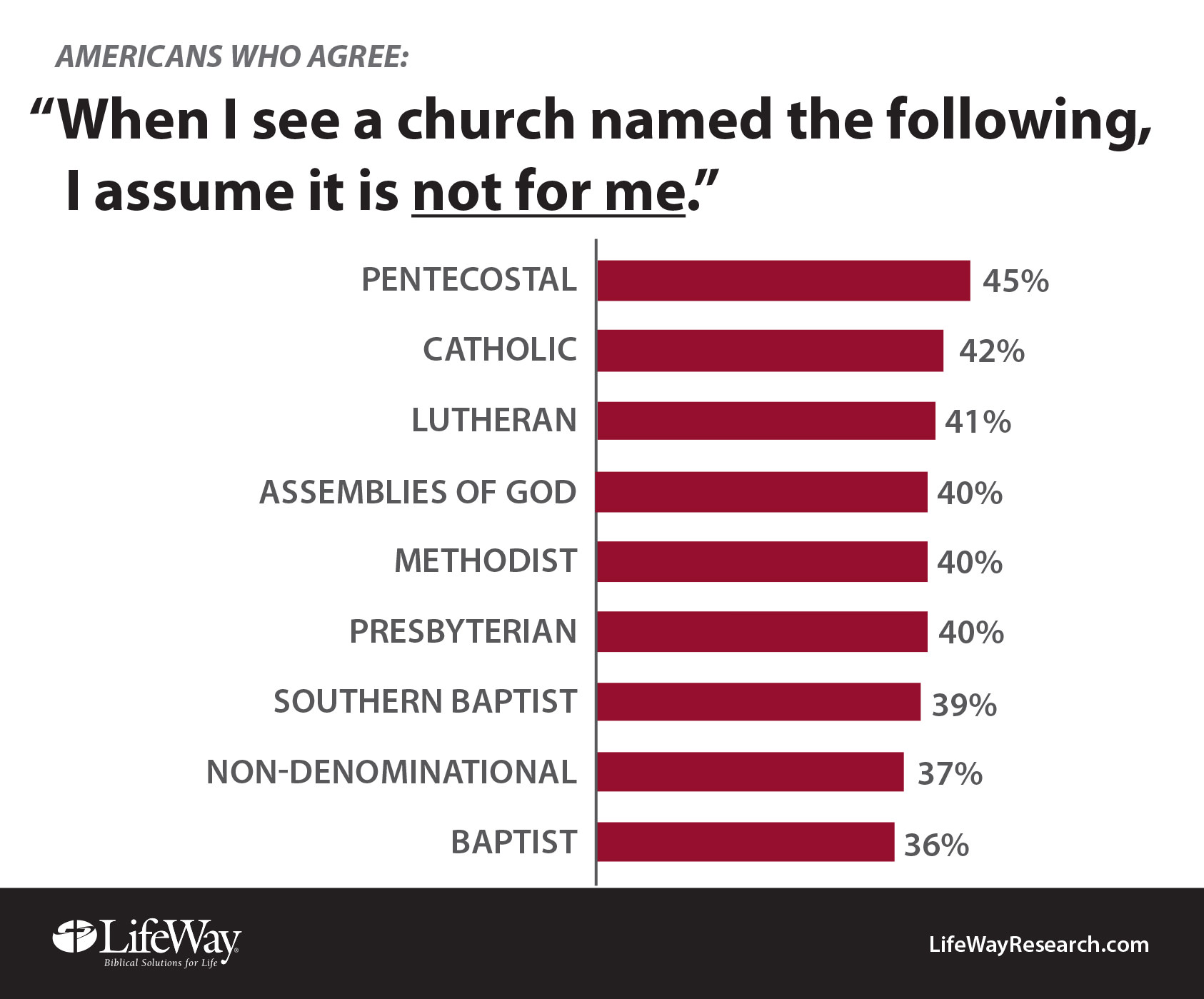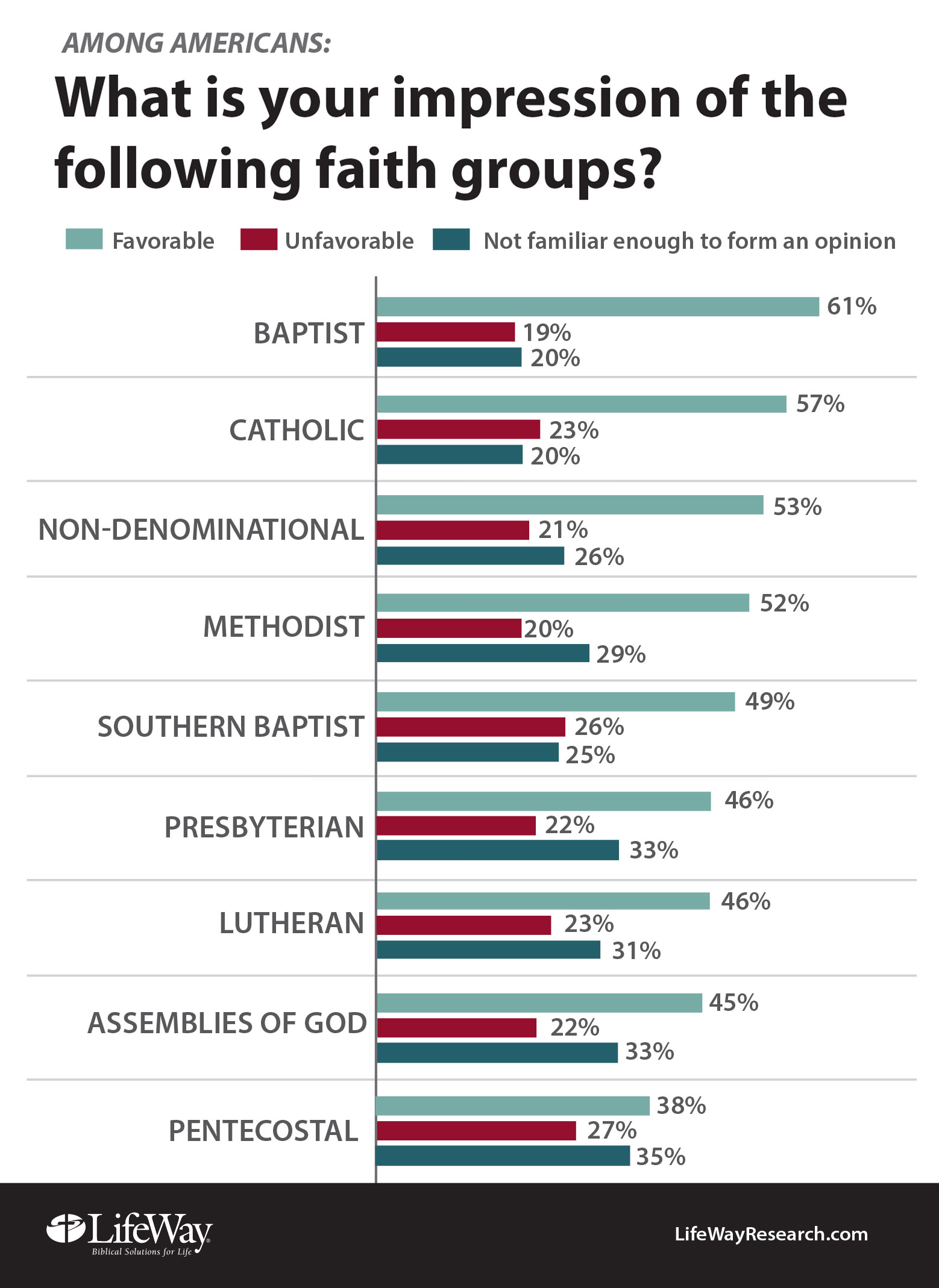By Ken Walker
Americans have a surprising openness to Christian churches, even those who are supposedly turned off to religion, a new survey finds.
No matter which denomination is in the name of a church, fewer than half the nonreligious say “it’s not for me.” Their views are more favorable than unfavorable toward a wide range of faiths—Catholic, Methodist, Baptist, Lutheran, Assemblies of God, and non-denominational.
These findings, based on a new survey of denominational opinions by Lifeway Research, may come as a surprise to those who’ve seen recent headlines. Growing numbers of people who don’t identify with any church have gathered considerable media attention. But Lifeway Research vice president Scott McConnell says many of these “nones” aren’t as closed to church as many assume.
“Just because someone has no religious preference does not mean they have closed the door to the Christian church or a denomination as being something that can meet needs in their lives,” McConnell says.
The recent nationwide telephone survey of 1,000 adults of varying ages, backgrounds, and beliefs posed two types of questions. In addition to asking whether nine denominations or faiths are for them, researchers sought to determine whether Americans’ image of each group is favorable or unfavorable.
Among the overall findings:
- No denomination is ruled out by a majority. People are most skeptical about Pentecostal churches, but even then only 45 percent declare, “it’s not for me.”
- Impressions of each denomination are more favorable than unfavorable.
- However, many people don’t understand denominational differences. For each faith, 20 percent to 35 percent say they are not familiar enough to form an opinion. This group almost always outranks those with unfavorable views.
One in 5 say they are not familiar with Catholic or Baptist faiths. Even more—about 1 in 3—are unfamiliar with Lutheran, Presbyterian, Assemblies of God, or Pentecostal.
Many non-Christians open to denominations
Though they may be puzzled about what a denomination teaches, many Americans are receptive to church, the survey shows. While 40 percent to 48 percent of the nonreligious—atheists, agnostics and those with no religious preference—assume such groups as Catholics, Baptists and Pentecostals are “not for me,” a majority don’t automatically exclude them.
In addition, anywhere from one-third to half of those from non-Christian religions do not assume the nine denominations named in the study are “not for me.”
“One might assume that when someone makes a conscious decision in favor of a certain religious preference, that means ‘no’ to everything else,” McConnell says. “While many are not open, to see half of the ‘nones’ and a third of those in other religions indicate they are not closed to Christian churches makes us re-think that.”
Denomination’s name may do no harm
In addition, the research shows that a trend in recent years to omit denominational identity from a church’s name may not help attract non-members.
“It would depend on who you’re trying to reach,” McConnell says. “But some denominational groups have as much ‘brand equity’ as non-denominational churches, which have been growing the fastest.”
The best-known faiths garner the most approval. Baptist and Catholic—which have the highest rate of familiarity (and the highest number of adherents)—top the survey for favorable impressions, with 61 percent for Baptist and 57 percent for Catholic. Most respondents also look favorably on non-denominational churches (53 percent) and Methodists (52 percent).
Conversely, only 38 percent hold a favorable view of Pentecostals, while 35 percent say they aren’t familiar enough to form an opinion. Fewer than half also report favorable impressions of Southern Baptists, 49 percent; Lutherans, 46 percent; Presbyterians, 46 percent; and Assemblies of God, 45 percent.
“It’s not necessarily a negative to include the denomination’s name,” McConnell says. “But in looking at the overall totals there are problems with preconceived notions with any name signaling where you are, theologically or historically. It also appears the Assemblies of God is probably pulling up the Pentecostal perception and Southern Baptists are negatively impacting the Baptist brand.”
Few rule out Baptist, non-denominational churches
People are most open to Baptist and non-denominational churches, the study found, with “it’s not for me” chosen by only 36 percent for Baptist churches, 37 percent for non-denominational churches and 39 percent for Southern Baptists. No faith group is ruled out by more than half of those surveyed, but 41 percent say the Lutheran church is not for them, and 40 percent feel that way about the Assemblies of God, Methodists and Presbyterians.
Though most Americans report favorable opinions of Catholicism, 42 percent say the Catholic faith is not for them. An even higher share, 45 percent, feels that way about the Pentecostal church.
Education also influences perceptions. For example, those with a graduate degree are more likely to assume groups like Baptists and Pentecostals are not for them than people with a bachelor’s degree or less education.
When it comes to the church’s future, McConnell points to one finding that should concern each denominational group tested. More than 4 in 10 young adults age 18-24 indicate various denominations are not for them.
“While young adults are often testing their views as they enter their 20s, about half do not perceive Catholic, Methodist, Presbyterian, Pentecostal, Lutheran or non-denominational churches as places for them as they explore,” McConnell says.
Ken Walker is a freelance writer from Huntington, W.Va.
Methodology
The phone survey of Americans was conducted Sept. 26-Oct. 5, 2014. The calling utilized Random Digit Dialing. Sixty percent of completes were among landlines and 40 percent were among cell phones. Maximum quotas and slight weights were used for gender, region, age, ethnicity, and education to more accurately reflect the population. The completed sample is 1,000 surveys. The sample provides 95 percent confidence that the sampling error does not exceed plus or minus 3.5 percent. Margins of error are higher in sub-groups.
Lifeway Research is a Nashville-based, evangelical research firm that specializes in surveys about faith in culture and matters that affect the church.









